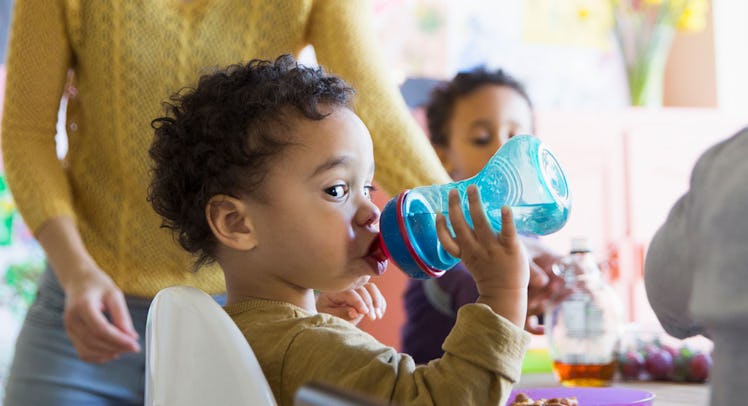AAP Warns Against Microwaving Plastic Bottles And Sippy Cups
The heat releases hazardous chemicals in the plastic, and that's not good.

Parents may want to cut back on microwaving their kid’s leftovers ⏤ at least before removing them from plastic containers. The American Association of Pediatrics announced recently that placing plastic containers ⏤ including baby bottles, sippy cups, and toddler plates ⏤ in either the microwave or dishwasher can expose children to harmful chemicals.
The reason is that Bisphenols (BPA), phthalates, and nitrates ⏤ all substances harmful to children ⏤ are all commonly found in plastic food packages. The AAP published a report earlier this month urging policymakers to introduce stronger federal food safety requirements and cited the potential harm caused by everyday plastic containers like water bottles or takeout containers in their argument.
The report warns that “since heat can cause plastics to leak BPA and phthalates into food, avoid microwaving food or beverages (including infant formula and pumped human milk) in plastic when possible.” The same can happen when plastics go in the dishwasher, even on the top shelf. The toxins released by heated plastic have been linked to complications with brain development, autism, obesity, ADHD, and muscle and bone development.
While many baby and kids products are made BPA-free these days (parents should always check), the report warns against plastics with recycling codes 3, 6, and 7. Instead, it recommends switching to glass or stainless-steel containers.
Megan McSeveney, a representative of the U.S Food and Drug Administration, told USA Today that the FDA is reviewing AAP’s findings, but that the chemicals cited have been “generally recognized as safe” and are not harmful when used properly. Regardless of what the FDA concludes, however, it’s still better to be safe than sorry ⏤ get those plastic dishes out of the microwave.